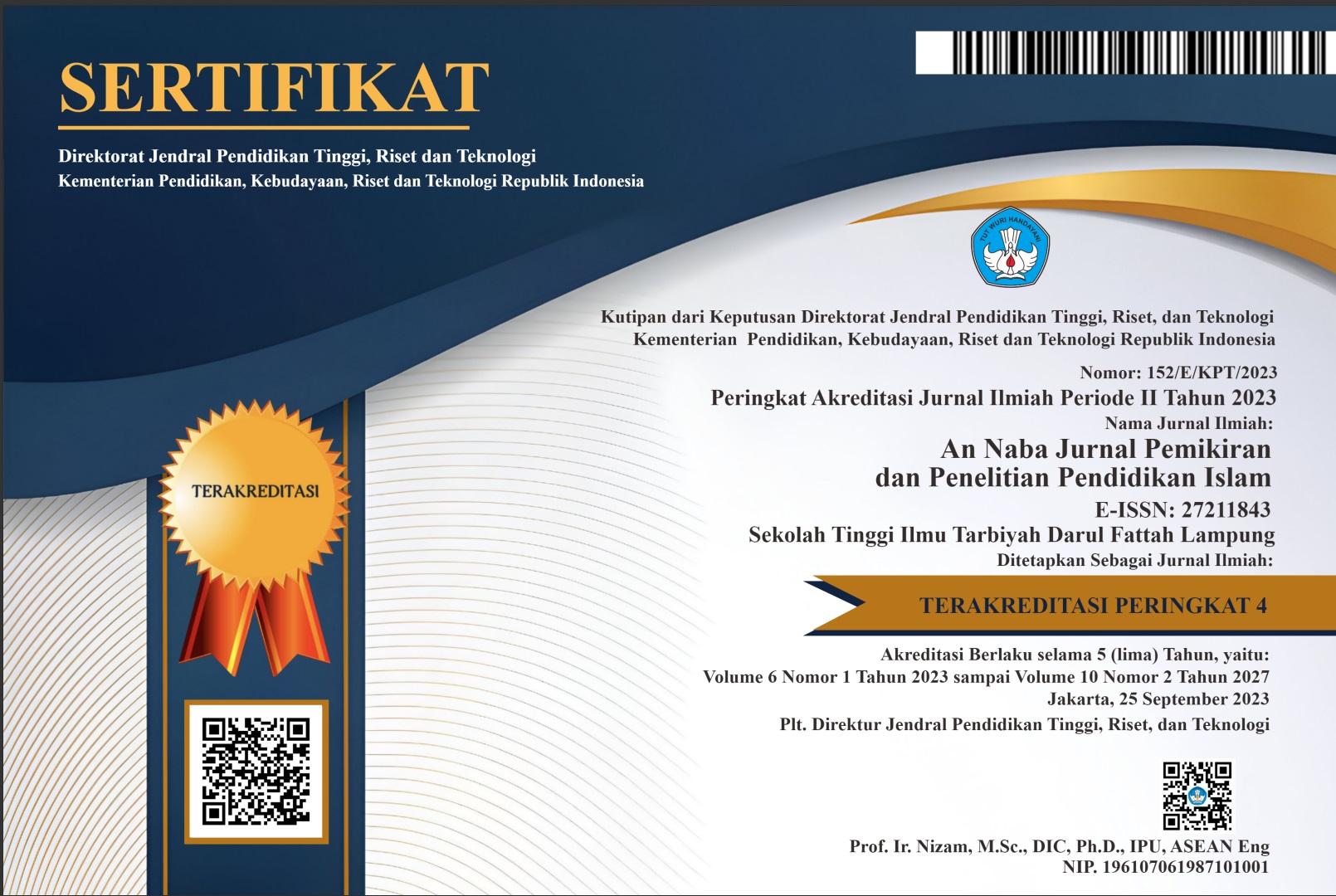Implementasi Nilai Akhlak Di Sekolah Islam Terpadu (Penelitian Di SDIT Permata Bunda 2 Bandar Lampung)
DOI:
https://doi.org/10.51614/annaba.v6i2.305Keywords:
Implement, Moral Values, Integrated Islamic SchoolAbstract
To answer the current challenge of moral degradation, implementing (Hardiansyah & Mas’odi, 2020; Syafiqurrohman, 2020) moral values at Integrated Islamic School (Research at SDIT Permata Bunda II Bandar Lampung) is something that is very important in the lives of students, especially at school. The purpose of this research is to identify and explore the transformation process of moral values at SDIT Permata Bunda II Bandar Lampung. This research method is a qualitative descriptive method with data collection tools, namely observation and interviews, to one school principal and one PAI subject teacher. The findings of this study are that there has been an implementation of moral values through school programs including; Congregational prayers, memorization of 2 chapters of the Qur'an, alms, Islamic Boarding School Ramadhan, MPLS (Introduction to School Environment, social service and nature tadabbur). The implementation of the program produces two main moral values, namely: divine values (faith and piety), humanity ( discipline, responsibility, care for others, optimism and self-confidence).The process of implementing moral values uses three stages, namely: value transformation (understanding), value transaction (understanding), value trans internalization (practice).
Keywords: Implement, Moral Values, Integrated Islamic School
References
Ainiyah, N. (2013). Pembentukan Karakter Melalui Pendidikan Agama Islam. Al-Ulum, 13(1), Article 1.
Bahroni, M. (2018). Analisis Nilai-Nilai Pendidikan Akhlak Dalam Kitab Taisirul Khallaq Karya Syaikh Khafidh Hasan Al-Mashudi. Intelektual: Jurnal Pendidikan Dan Studi Keislaman, 8(3), Article 3. https://doi.org/10.33367/intelektual.v8i3.728
Fithriyah, N. N. (2022). Implementasi Nilai Pendidikan Akhlak Dalam Surah Al An’am Ayat 151 Pada Anak Usia Sekolah Dasar. Jurnal Madrasah Ibtidaiyah, 1(01), 33–47. https://doi.org/10.55732/jmi.v1i01.715
Hardiansyah, F., & Mas’odi, M. (2020). Implementasi Nilai Religius Melalui Budaya Sekolah: Studi Fenomenologi. Autentik : Jurnal Pengembangan Pendidikan Dasar, 4(1), 15–24. https://doi.org/10.36379/autentik.v4i1.49
Jatmiko, A. (2016). Pendidikan Berwawasan Ekologi Realisasi Nilai-Nilai Ekologis dalam Kurikulum Pendidikan Agama Islam. Jurnal Pendidikan Islam, 7.
Mariamah, Dute, H., & Ratnawati. (2022). Model Pendekatan Guru Pendidikan Agama Islam Dalam Pembinaan Akhlak Siswa Di Sd Ypkp Sentani. AT-Ta’dib : Jurnal Kependidikan Dan Keagamaan, 6(2), Article 2.
Nursikin, M. (2019). Implementasi Nilai-Nilai Akhlak terhadap Dosen Kesehatan dalam Prespektif Islam di Akademi Kebidanan Yogyakarta. Istawa: Jurnal Pendidikan Islam, 3(2), 25. https://doi.org/10.24269/ijpi.v3i2.1500
Salsabila, K., & Firdaus, A. H. (2018). Pendidikan Akhlak Menurut Syekh Kholil Bangkalan. Jurnal Penelitian Pendidikan Islam, 6(1), 39. https://doi.org/10.36667/jppi.v6i1.153
Syafiqurrohman, M. (2020). Implementasi Pendidikan Akhlak Integratif-Inklusif. QALAMUNA: Jurnal Pendidikan, Sosial, dan Agama, 12(01), 37–48. https://doi.org/10.37680/qalamuna.v12i01.240
Mahjuddin. Akhlak Tasawuf 1 (Mukjizat Nabi Karomah Wali dan Makrifat Sufi. Jakarta: Kalam Mulia, 2011.
Moleong, Lexy J. Metode Penelitian Kualitatif. Bandung : PT. Remaja Rosdakarya, 2006.
Rahmawati, A. (2022). Kurikulum Sekolah Islam Terpadu; Buku Penerbit LovRinz. LovRinz Publishing.
Sugiono. Metode Penelitian Pendidikan Pendekatan Kuantitatif, Kualitatif dan R&D. Bandung : Alfabeta, 2008.














.png)




